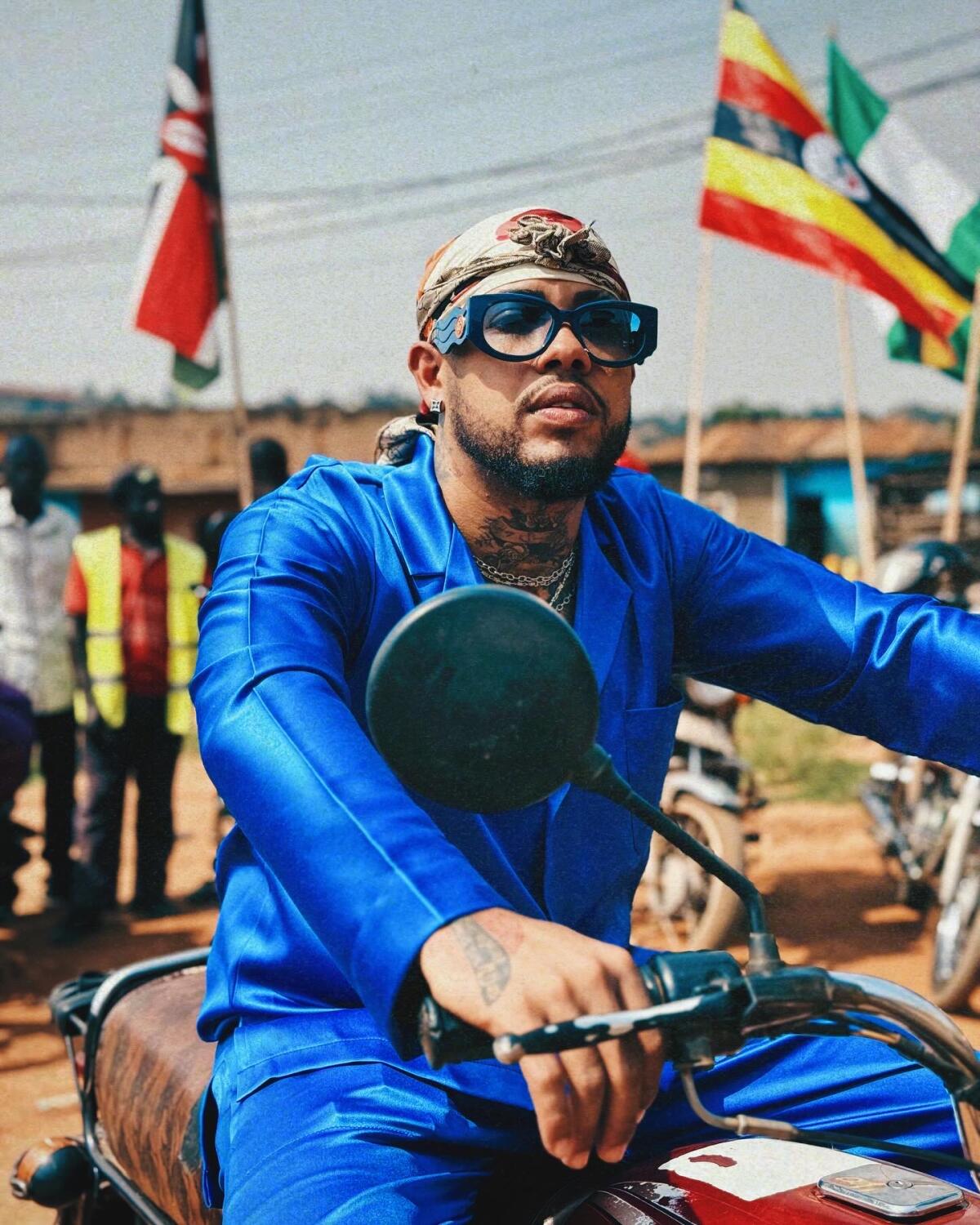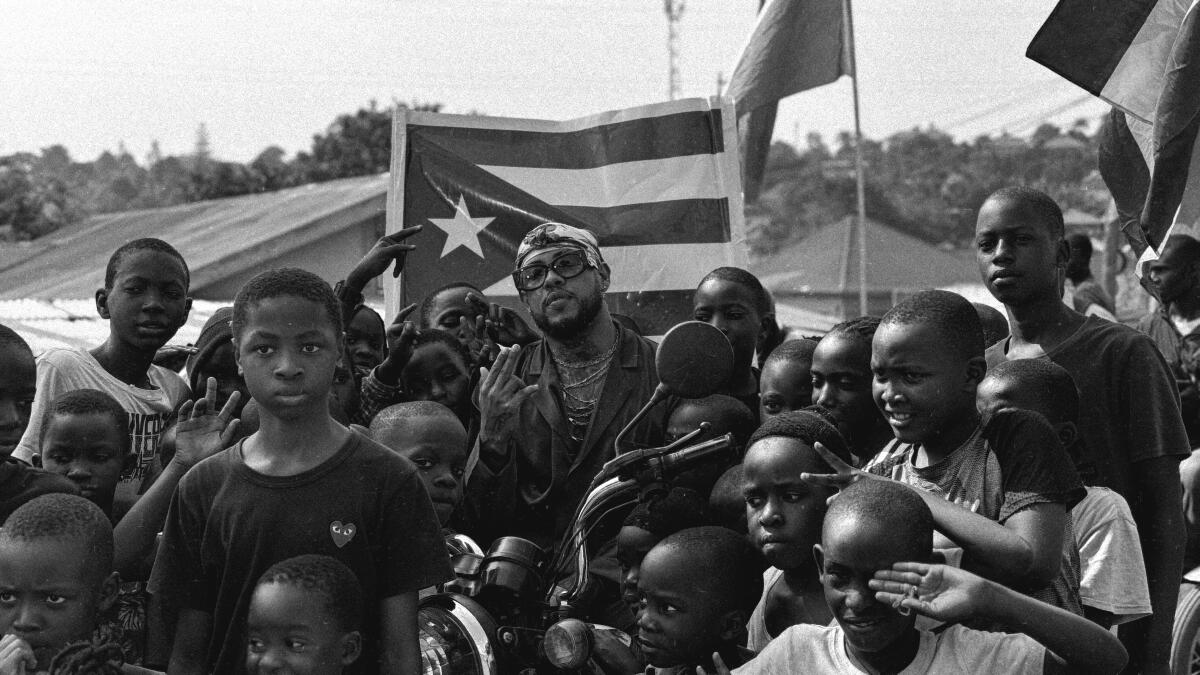Inspired by African sounds, Rafa Pabön pushes the boundaries of urbano

- Share via
On a late October night last year in Puerto Rico, Rafa Pabön felt the sudden urge to create a new song.
Around midnight, the 27-year-old singer/songwriter had finished rehearsing with his band. Everybody else was ready to call it a day, but Pabön convinced a number of co-conspirators — including acclaimed Cuban vocalist Daymé Arocena and A-list reggaetón producer Mr. NaisGai — to reconvene at his home studio. There, he began to improvise a vocal line set to a nimble, Afrobeats rhythm.
“I rarely go into my studio in the middle of the night,” Pabön recalls during a brief stay in Miami for a concert and recording sessions. “But my guitarist agreed to join us, reluctantly, and the word ‘aiwo’ appeared in my mind out of nowhere. I kept singing it, scrambling to add another section to the tune, when Daymé told me to stop. ‘You have your chorus, Rafa,’ she said. ‘The song is already there.’”
A few weeks later, Pabön traveled to Uganda and brought a camera with him. The “Aiwo” demo still in his mind, he enlisted local dance troupe Ghetto Kids for a music video that connects the dots between Afro music and Pabön’s Spanish-speaking Puerto Rican heritage.
Released in February to moderate streaming numbers but resounding critical success, “Aiwo” reaffirmed Pabön as one of the most radical and original artists working in Latin music today — a globally minded songwriter who generates esoteric combinations of styles while staying grounded to the pop zeitgeist. As it turns out, “Aiwo” also became the stepping stone for Pabön’s next album, an epic project in the making inspired by African music.

“Aiwo” shines both as a catchy urbano hit and an arty gem. Its spacey bass line, Afro background vocals and subtle melodic effects are complemented by Pabön’s rapping. He twists the accents of Spanish words, breaking down syllables to generate witty percussive effects. And what are the lyrics about? In full top-10 mode, he rhapsodizes about meeting a woman like no other, wanting to contemplate every single sunrise with her.
“I don’t do it on purpose, but I do have an understanding of how the music business operates,” he said. “I learned to be a hybrid. I can do a party song because I’m young — I like to go out and have fun and get drunk. But I also educate myself and was raised with the notion that there’s a purpose to my existence, a responsibility.”
“Rafa’s musical vision is incredibly open,” says Daymé Arocena, whose recent album “Alkemi” includes a duet with Pabön and is already a contender for best Latin album of 2024. “I know artists who are scared of following their own muse. Rafa is never afraid of that — he is honest about his feelings. Right now he’s immersed in a journey into the essence of his own roots. This connection with the earth — the epicenter, the Blackness — adds a different color to his music.”
Pabön’s biggest hits so far have been high-profile collaborations with straight-ahead reggaetón artists. 2019 was the year when people began recognizing his name. He looks affable and charismatic on the visual for “Jangueo,” a song with Alex Rose which boasts over 350 million streams on Spotify. Around that time, he guested on a slick remix of Brytiago’s “La Mentira” with Myke Towers, Sech and other urbano stars.
Artistically, however, he caught the attention of tastemakers in 2023 with “Galería” — his third album — a sprawling Afro-Caribbean mosaic of monumental ambition. The aristocratic cadre of guests spans from former Los Van Van singer Mario “Mayito” Rivera to urbano superstar Rauw Alejandro and neo-flamenco goddess Buika. Still, the most stunning aspect of the album is its maker’s cosmopolitan soul. He zigzags gracefully from the reggae love paean “Manifestación de Amor,” with boricua band Gomba Jahbari, to the bossa tinged “Besos de Invierno.” The album’s closing cut, “Rosa,” is a traditional merengue that Pabön turned into a psychedelic experiment with the addition of Indian sitar.

“I make it a point to enjoy making every single song,” he says when asked about his penchant for reckless experimentation. With ‘Rosa,’ I wanted to create a merengue harking back to the essence of [Dominican master] Juan Luis Guerra, but I needed an added element that would completely separate it from the norm. I’ve done many weird songs. They may become global hits, or perhaps people will hate them, but the process of curation is anchored on a deep respect for all musical formats.”
Anybody who’s marginally familiar with Latin music will tell you how rigid and conservative its aesthetic parameters tend to be. An imaginary line is drawn in order to ensure that the commercial hitmakers — mostly young artists in the reggaetón, pop and música mexicana fields — are kept safely away from the poetic creations of icons such as Rubén Blades and Jorge Drexler. Pabön’s music operates in an altogether different universe, were such distinctions are considered a waste of time.
“Rafa’s music simply defies categorization,” says Buika, who added her smoky vocalizing to “Ay Amor,” a subtle, yet visceral marriage of flamenco and reggaetón. “He has created his own genre, embracing many different cultures and sounds. Rafa is a universal artist, and a very brave young man — the kind of person worth fighting for.”
“There are no dichotomies in his world,” Arocena said. “The urbano vibe comes natural to him, but so does the poetic songwriting. Inside his head, there is no conflict between the two worlds. Rafa appeared in my life to teach me a lesson: He demolished my preconceived notion that an urbano artist was meant to be superficial and removed from his roots.”
“I grew up listening to Calle 13, Don Omar and Tego Calderón — but also to artists like [nueva trova legend] Silvio Rodríguez, Víctor Jara and Los Van Van,” Pabön explains. “My parents listened to a lot of Cuban timba when I was growing up. I refuse to label my own sound. Let’s just say that I’m an artist. Tomorrow I may record a regional Mexican song, and the day after it could be trova — just as long as I wake up with the desire to play trova.”
Now, the “Aiwo” experiment has turned into an album that will find him traveling through Africa and exploring its musical roots. This month he will be flying to Nigeria, with Ghana and Cameroon as his next stops. Pabön plans to release the new project — coupled with a documentary — next year.
“Africa is the place where we all come from,” he says. “I want to go deep into the very foundation, and show people that music doesn’t need to be mechanical. It’s not all about making it big with a viral single. We can also make art just for the pleasure of creating it. More than a musical project, this is now a life project for me.”
More to Read
The biggest entertainment stories
Get our big stories about Hollywood, film, television, music, arts, culture and more right in your inbox as soon as they publish.
You may occasionally receive promotional content from the Los Angeles Times.








